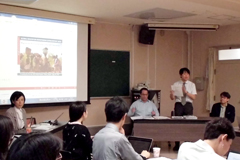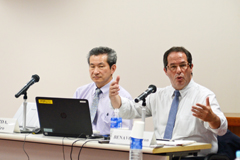UNESCO Global Education Monitoring Report Consultation Workshop
2017.08.03
On June 25, 2017, the JICA Research Institute (JICA-RI) hosted a consultation workshop discussing UNESCO’s 2019 Global Education Monitoring (GEM) Report on migration, displacement and education. The workshop was held at the University of Tokyo during the annual meeting of the Japan Comparative Education Society. Approximately 40 academicians participated, including university professors and researchers.
The GEM Report is an editorially independent annual report published by UNESCO since 2002. Its current mandate to monitor education in the 2030 Agenda for Sustainable Development, especially Sustainable Development Goal (SDG) 4 (“Ensure inclusive and equitable quality education and promote lifelong learning for all.”), derives from the Incheon Declaration adopted at the World Education Forum in May 2015. Each Report also proposes evidence-based policies and strategies to support the efforts by governments, communities, civil society, bilateral donors, and international agencies to achieve global education targets by 2030.

Participants had a discussion about the GEM Report at the University of Tokyo on June 25
Nobuko Kayashima, JICA-RI deputy director, delivered her opening address by saying that it was an honor to have the chance to participate in the process of developing the GEM Report, one of the UNESCO's flagship reports, by cooperating with leading researchers in Japan.
Aaron Benavot, Director of the GEM Report, began by explaining the theme for 2019, “Migration, Displacement and Education.” He emphasized that it is difficult to give “migration” a standard definition because it includes diverse populations and circumstances—for example, refugees who are forced to migrate due to conflict or disaster, people who cross international borders of their own volition to study abroad or find employment, people who move from one location to another within a nation’s borders, and internally displaced persons.
Following these opening remarks, five Japanese researchers gave brief presentations. Kazuo Kuroda, JICA-RI Visiting Fellow and Professor at Waseda University, presented the findings from his research on changes of awareness in international students who come to Japan and Japanese students who go abroad. Shingo Ashizawa, Professor at Toyo University, discussed a system for recognition of foreign credentials and quality assurance in higher education institutions in Asia and Japan. Hideki Maruyama, Associate Professor at Sophia University, spoke on how the Japanese education system addresses the needs of migrant children in Japan. Tomoko Tokunaga, Project Assistant Professor at Keio University, presented a case study of the school education of the children of Filipino immigrants. Mariko Shiohata, Director of the international program Save the Children Japan, addressed the challenges in the educational curriculum of the Karen people of Myanmar.
In the context of these presentations, participants at the workshop discussed issues not covered in the GEM Report and areas that should be given greater emphasis from four perspectives: (1) In what ways does international or internal migration accelerate or hinder progress in education access and completion? (2) In what ways do international and internal migration and forced displacement influence the quality of education? (3) Which education policies and programs are most effective in improving educational outcomes among migrants and forcibly displaced persons? (4) In what ways can the voices of migrants and refugees improve our understanding of migration, displacement, and education?
The next day, Benavot visited JICA-RI. JICA-RI Research Officer Naoko Arakawa serving as moderator, Benavot described the overall content of the GEM Report on Accountability in Education, which is scheduled for launch on October 24 of this year. Then, Kazuhiro Yoshida, Professor at Hiroshima University and Co-chair of the SDG-Education 2030 Steering Committee (a global coordination mechanism led by UNESCO), commented on it.
JICA-RI Director Naohiro Kitano delivered opening remarks in which he introduced JICA’s position paper on the SDGs issued last year. Kitano explained that the position paper acknowledges education and health as the foundations of sustainable development. He said JICA could utilize its development experience and its expertize to play a critical role in achieving SDGs, including SGD4.

Kazuhiro Yoshida, Professor at Hiroshima University (left) and Aaron Benavot, Director of the GEM Report
Benavot explained that accountability policies and practices have often been viewed as a solution to various issues and challenges in education, such as improving the academic achievement of children and preventing teachers’ absence. The 2017/18 GEM Report will focus on how accountability is used in education to achieve SDG4 from the perspectives of different actors: government, schools, teachers, civil society, parents, students, the private sector and international organizations. Benavot said that in developing accountability mechanisms that consider the multiple involved actors in education, rather than just a portion of them, significant change can occur. For example, instead of holding only teachers responsible for problems in the quality of education, it is important to establish an enabling environment in which schools, governments, local communities, and a variety of other actors, including teachers, can fulfill their roles and responsibilities effectively.
In response, Yoshida said that the aim of the current SDG 4 is ambitious not only for developing countries but also for the developed countries. He also pointed out that the monitoring framework of SDG4 includes indicators that are difficult to define and measure, such as "achieving at least a minimum proficiency level in reading and mathematics." He concluded that critically examining the utilization of result-based financing by donors as an indicator is also necessary. The workshop participants actively engaged in discussions with the speakers and asked a wide range of questions.

事業事前評価表(地球規模課題対応国際科学技術協力(SATREPS)).国際協力機構 地球環境部 . 防災第一チーム. 1.案件名.国 名: フィリピン共和国.

事業事前評価表(地球規模課題対応国際科学技術協力(SATREPS)).国際協力機構 地球環境部 . 防災第一チーム. 1.案件名.国 名: フィリピン共和国.

事業事前評価表(地球規模課題対応国際科学技術協力(SATREPS)).国際協力機構 地球環境部 . 防災第一チーム. 1.案件名.国 名: フィリピン共和国.

事業事前評価表(地球規模課題対応国際科学技術協力(SATREPS)).国際協力機構 地球環境部 . 防災第一チーム. 1.案件名.国 名: フィリピン共和国.

事業事前評価表(地球規模課題対応国際科学技術協力(SATREPS)).国際協力機構 地球環境部 . 防災第一チーム. 1.案件名.国 名: フィリピン共和国.
scroll